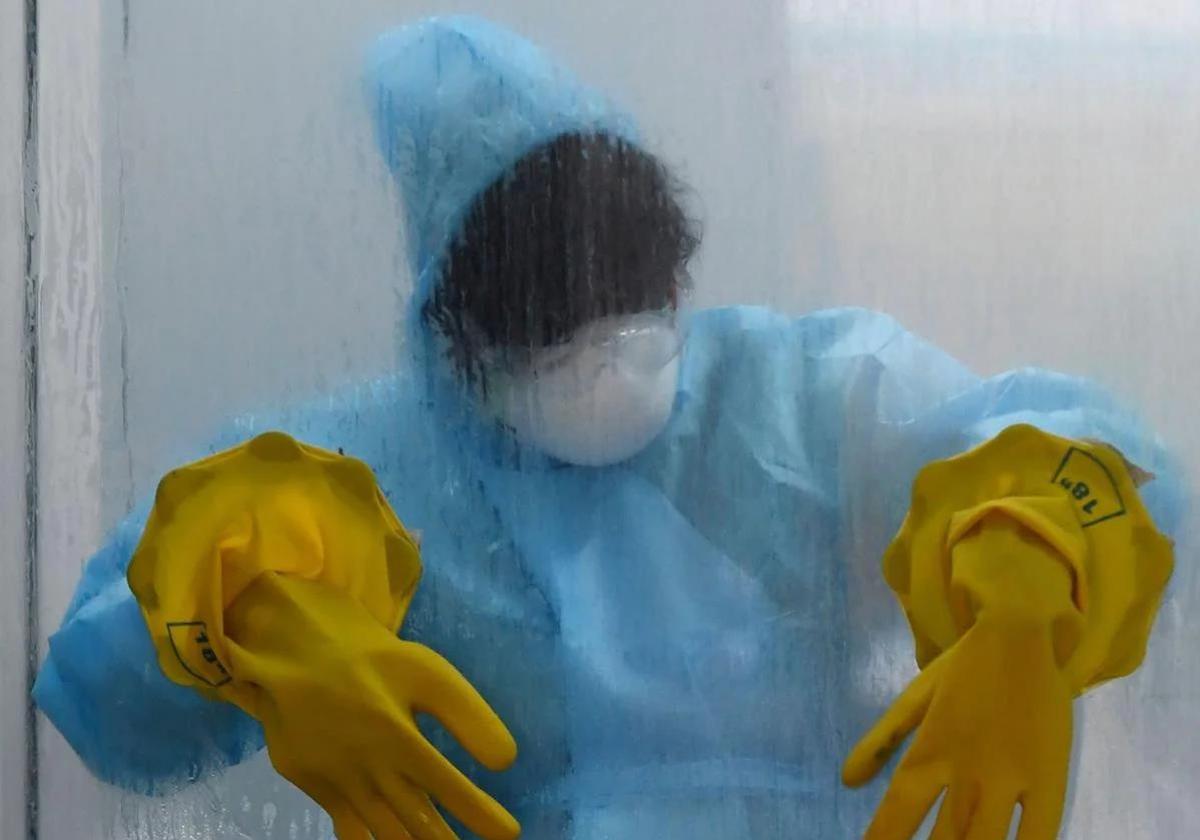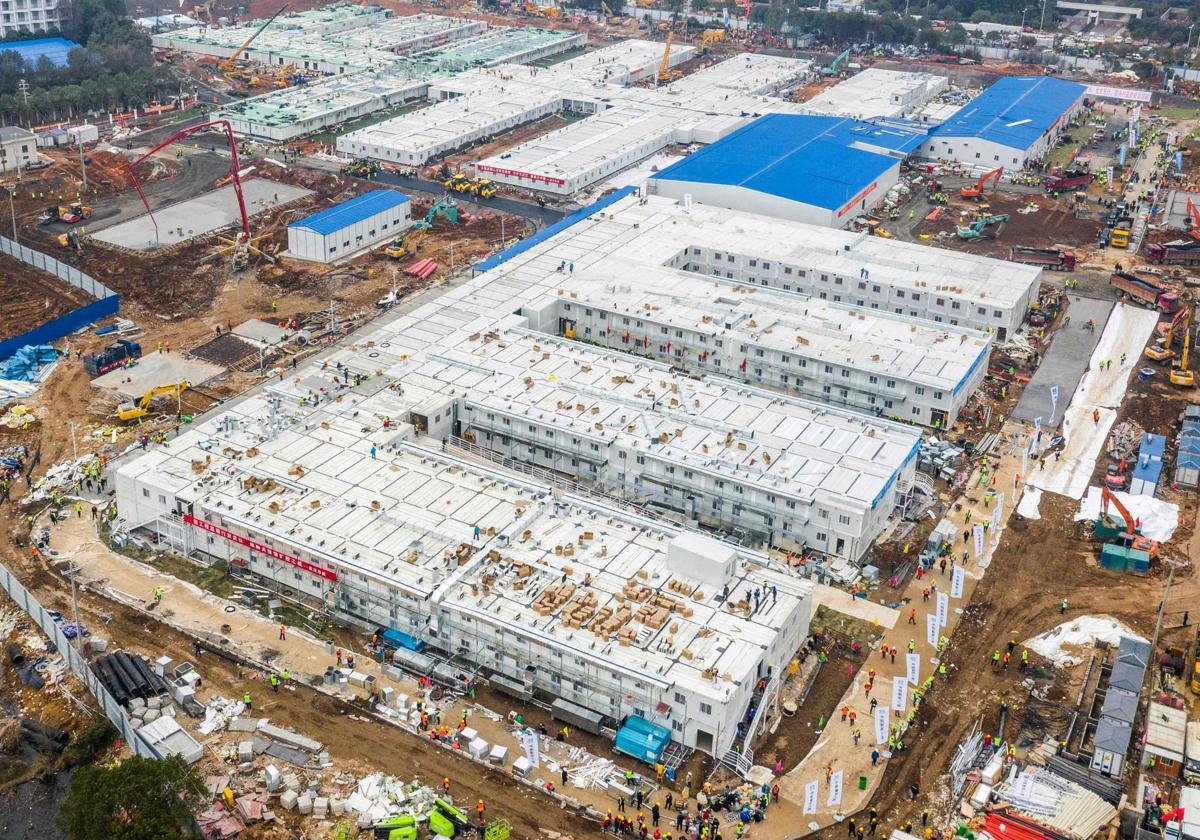

Sections
Highlight

Five years ago, a patient suffering from pneumonia of unknown origin died at the Arnau Vilanova Hospital in Valencia. His death, however, was not made public until 18 days later, on 3 March 2020. After a second analysis, it was confirmed that he was the first Covid-19 fatality in Spain. It also became clear that the coronavirus was going to leave much more than "some confirmed cases" in our country and that the pathogen that had raised a loud alarm in China would have a considerable impact. What no one could foresee yet was that it would completely change the world.
However, the first news, which started a steady thread in December 2019, went unnoticed. They were short texts published in regional Chinese media, reporting strange cases of atypical pneumonia in the city of Wuhan. Some 'netizens' - members of an internet community - in the Asian giant pointed out that the common link was to a food market where wild animals, such as pangolins, were traded. It was the authorities that blocked these messages and played down the issue.
On the last day of December, the increase in cases had already alarmed doctors like Li Wenliang, who warned his contacts of the danger of this unknown disease, reminiscent of the SARS that infiltrated the world between 2003 and 2004 and left more than 800 dead. He paid for his audacity with a controversial administrative reprimand, only for the virus to claim his life, making him the first hero of the pandemic that was taking shape and a symbol of a lack of transparency that will always haunt the world's second-largest country.

"We continue to keep China accountable for the spread of information, to understand the origins of Covid-19. This is a moral and scientific imperative. Without transparency and collaboration between countries, the world cannot prevent or prepare for future pandemics," said the World Health Organisation, in an article published to mark the five-year anniversary since it received the first pieces of information about the Wuhan outbreak at the end of December 2019.
It took three more weeks for the Chinese authorities to acknowledge that the coronavirus was passed from human to human. Another three days later, on 23 January, they took a decision as drastic as it was unprecedented: the confinement of a city of eleven million people. Conspiracy theories ran wild. Some claimed that the Chinese Communist Party was manipulating the death toll, pointing to the high activity of crematoriums. Others have traced the path of the virus retrospectively - from the Huanan market to the top virology lab, where, they believe, a scientist was mistakenly infected. While no one has completely ruled out this theoriy, for some it expands as far as speculating that the virus was created on purpose in the lab's facilities. Nowadays, anyone attempting to take photographs of both sites (the market and the lab) is quickly intercepted by the police.
The Wuhan quarantine was met with global criticism for the freedoms it violated. It was unthinkable that such a situation could be reproduced in established democracies, especially when the WHO had not even activated the international emergency, although the further spread of the virus ended up forcing the organisation to do so on 30 January. Eventually, reality prevailed: with no masks or tests, health workers protected by rubbish bags and the ER collapsed, the myth of Europe's formidable health systems crumbled. In its place emerged the enormous dependence on Chinese products.
"At the beginning, we were the ones who would send masks to our colleagues in China. Then, when we needed them, supplies were nowhere to be found," said Iñaki Antoñanzas, former director of Fagor Automation in Beijing. It was clear to Chinese authorities that they had to prioritise the domestic market, which led to a halt to exports of personal protective equipment (PPE). Face masks - items that became compulsory even for going out on the streets - were being rationed. Men dressed in astronaut suits and armed with an infrared thermometer became a regular scene. Once again, the 'great dragon' led the way most rejected by the West, who showed disdain and superiority, only to be forced to follow the example not long after.
March saw a cascade of confinements that plunged hundreds of millions of people into a science fiction film, the set of which consisted of empty streets with only wild animals roaming, hospitals overflowing and mass graves being dug in developed countries. The Italian region of Lombardy, along with fourteen other cities in the country, were quarantined on the 8th, just as controversial Women's Day demonstrations were taking place in Spain.
Three days later, the WHO officially declared the Covid-19 pandemic. That same day, US President Donald Trump vetoed the entry of citizens from Europe, with the exception of the UK - a contradictory decision, given the lack of restrictions within the American superpower, which decreed a national emergency on the same day that Spain announced the country's confinement.
The world came to a grinding halt: travel restrictions grounded thousands of planes, much of commerce was forced to shut down, companies saw the rise of WFH (work from home). The most tragic records were broken day after day. On 10 April, the death toll exceeded 100,000; 18 days later, the US reached one million; and in May, the UN published its forecast for the worst global recession since the crisis of 1929. The forecasts got worse and worse each month, resulting in a global economic contraction of 4.3%.
6.86 million people
had died from Covid worldwide by 2023. Some 4,000 still die every week.
It was then that many national authorities faced a dilemma: coexist with the virus to save the economy despite the risk of many people dying, or protect their lives in the face of an economic hecatomb and social rebellion. Countries relied on a wide range of strategies: from Chinese and North Korean 'zero-covid', with closed borders, strict confinement and tight internal restrictions; to more or less free coexistence with the virus, with the US setting the example. Europe adopted a middle ground, making use of the controversial covid passports, first obtained with PCR or antigen tests and then with the vaccine.
It was these innovations, developed in record time, that allowed for a return to normality from 2021 onwards. Starting in late 2020, they provoked a geopolitical war that made clear the supremacy of money over all other considerations. The most developed countries stockpiled vaccines, while the least developed suffered the worst consequences of the pandemic.
Nearly 14 billion doses of vaccine
have been administered worldwide until 2025.
When it seemed that everything could only get better, the rebound in consumption brought about by the gradual removal of restrictions caused two other tsunamis: supply chain disruption and inflation, which, in many cases, went hand in hand. Suddenly, there were no chips, Chinese ports were closing and Western factories could not operate without components. Demand, which had been depressed, exploded without supply being able to catch up.
Fortunately, the initial variant evolved into the delta, and from the delta into the omicron. Each new strain was more infectious than the previous one, but caused fewer fatalities. The world gradually returned to its original state, with the exception of China. The country of origin maintained its zero-covid policy, until the population erupted in unusual demonstrations against the government and its leader, Xi Jinping, following a hellish confinement in Shanghai. The strategy was turned around and the Asian giant restarted its productive machinery, although the collective trauma left by the coronavirus is still felt profusely.
The official death toll was put at seven million, but the WHO has stated the real figure will never be known and may well be three times that estimate. Even today, thousands of people die from covid every week. Asked whether the world is better prepared to cope with an eventual future pandemic, WHO's general director Tedros Adhanom Ghebreyesus has said "yes and no", pointing that, "if it were to happen today, the world would be burdened by many of the weaknesses and vulnerabilities that allowed the covid debacle to happen. But it has also learned some of the painful lessons and taken significant steps to strengthen its defences". What is clear to all scientists is that such a pandemic will happen again.
Publicidad
Publicidad
Publicidad
Publicidad
Esta funcionalidad es exclusiva para registrados.
Reporta un error en esta noticia

Debido a un error no hemos podido dar de alta tu suscripción.
Por favor, ponte en contacto con Atención al Cliente.

¡Bienvenido a SURINENGLISH!

Tu suscripción con Google se ha realizado correctamente, pero ya tenías otra suscripción activa en SURINENGLISH.
Déjanos tus datos y nos pondremos en contacto contigo para analizar tu caso

¡Tu suscripción con Google se ha realizado correctamente!
La compra se ha asociado al siguiente email
Comentar es una ventaja exclusiva para registrados
¿Ya eres registrado?
Inicia sesiónNecesitas ser suscriptor para poder votar.